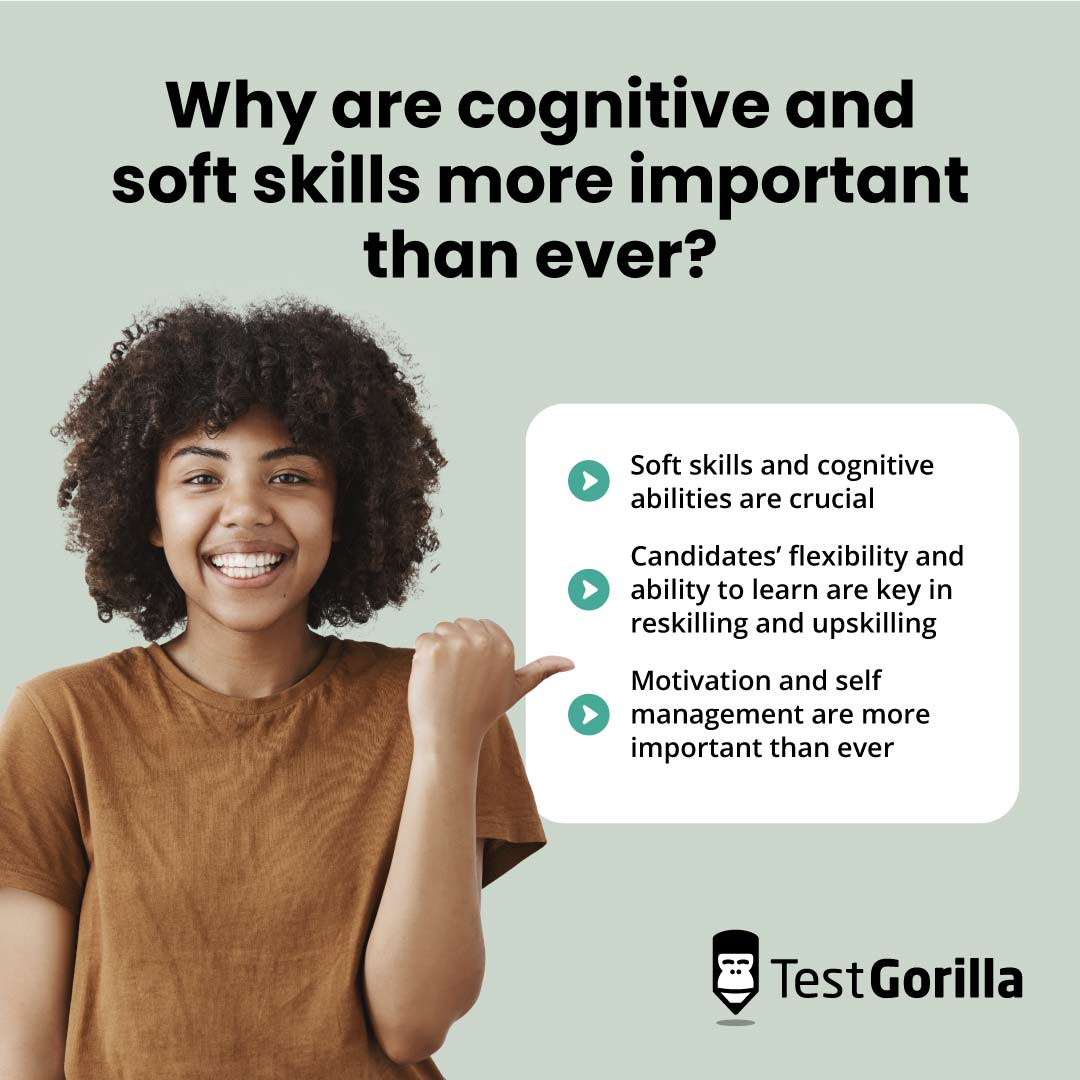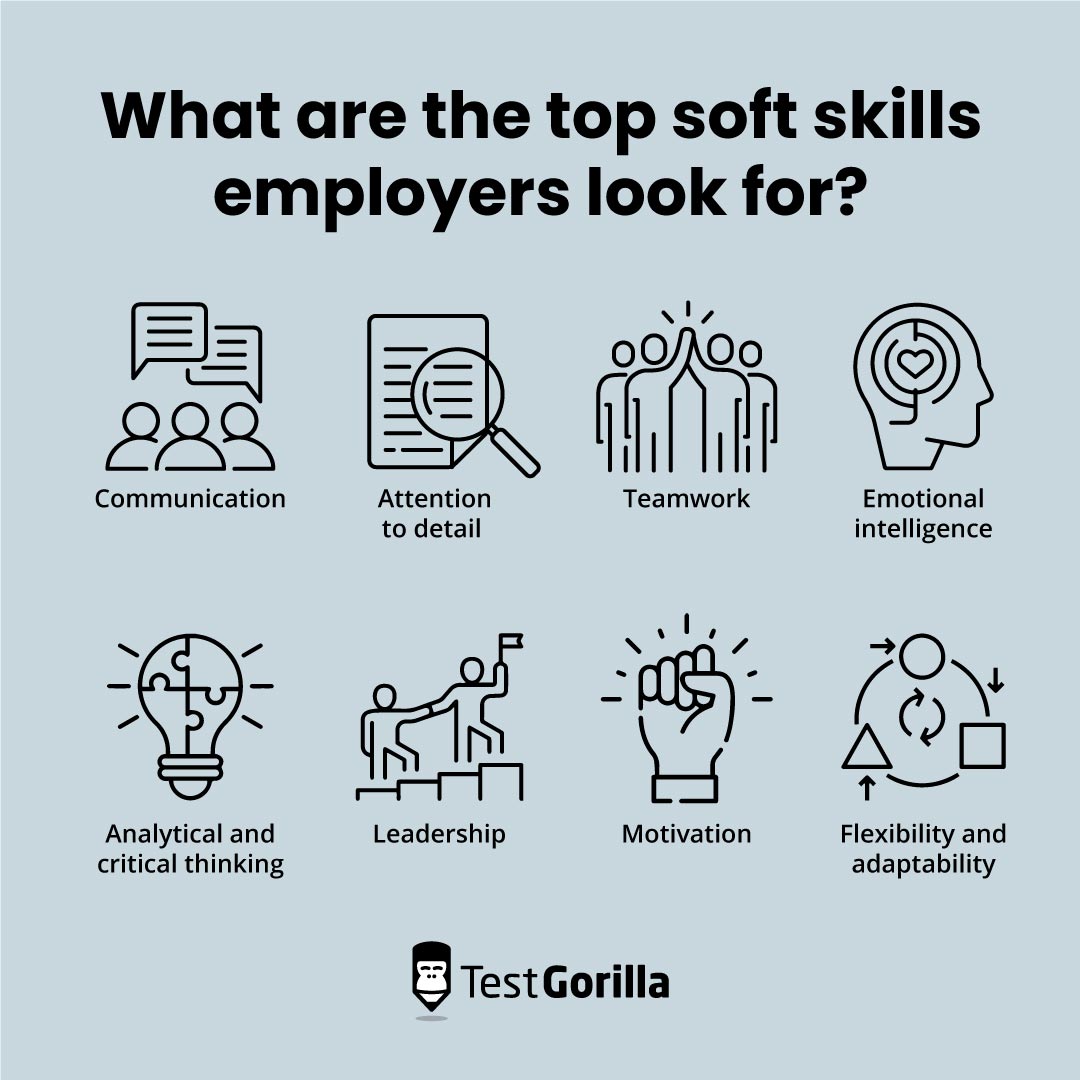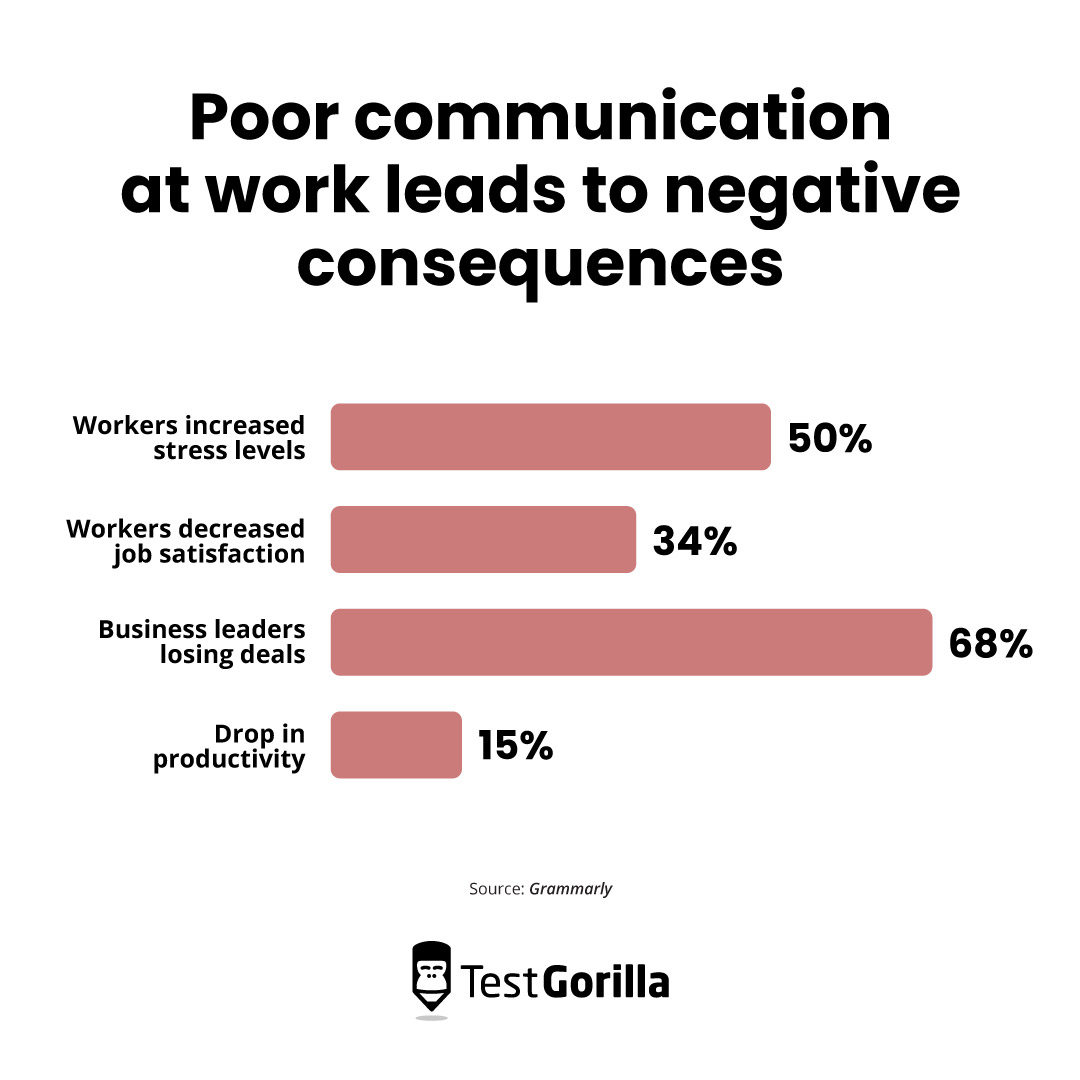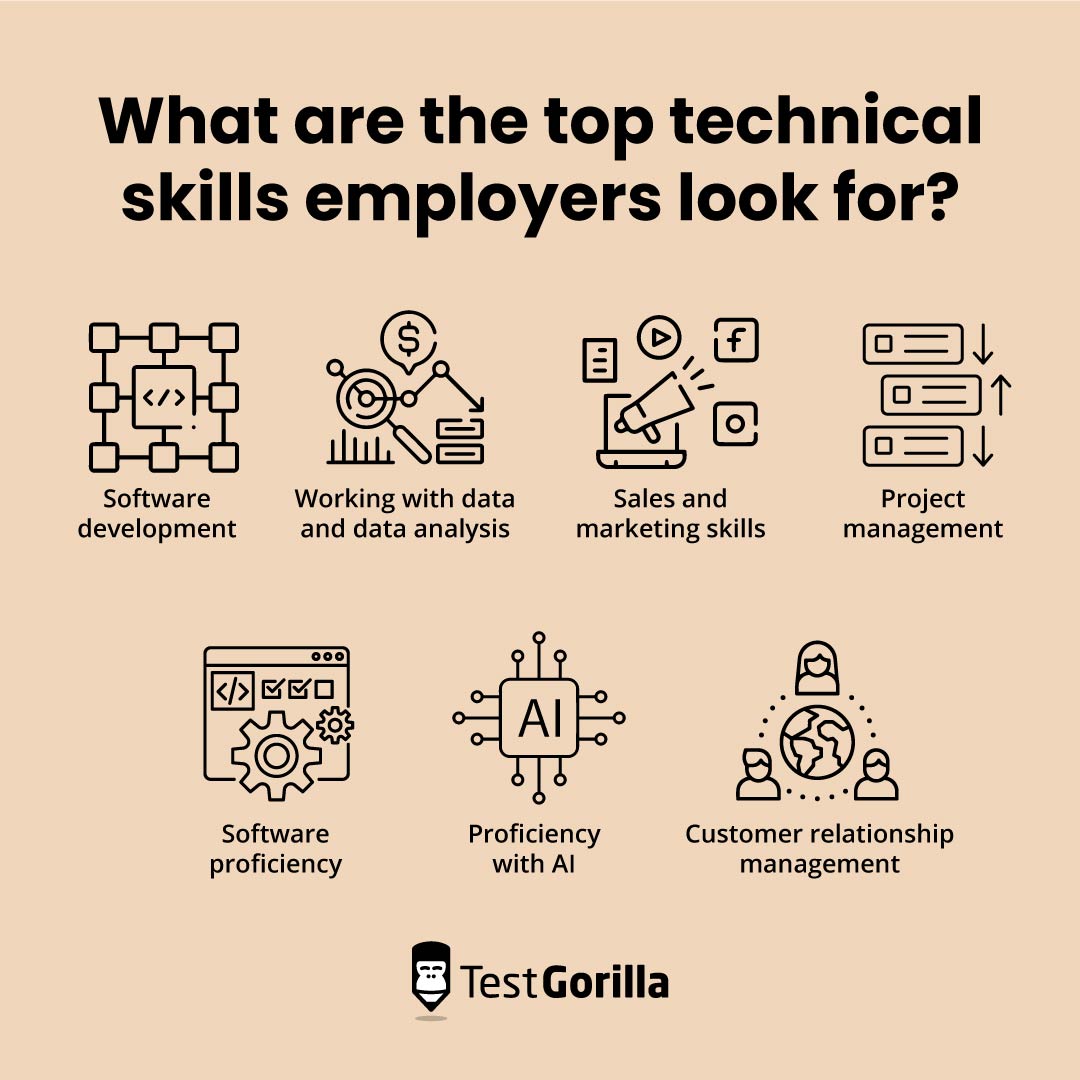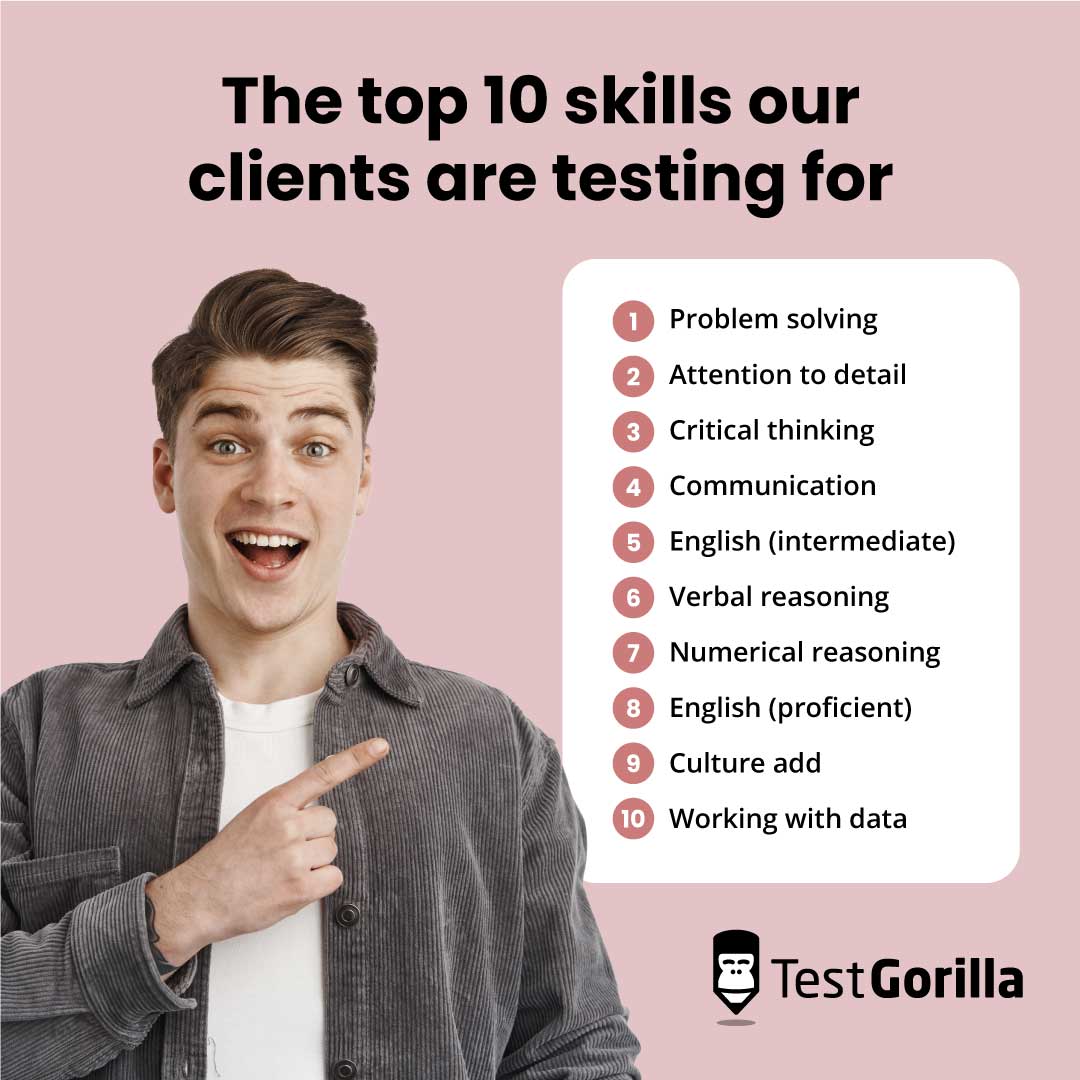Top skills employers look for in candidates – and how they assess each
From technical expertise to soft skills that show adaptability and teamwork, the range of skills employers look for is diverse – and it largely depends on the position.
However, there are some key skills that are important in many different roles, such as problem-solving, communication, attention to detail, and more.
Our clients often pick the same tests to evaluate candidates for a wide range of positions, which shows that there's certainly more to hiring than evaluating technical skills.
In this article, we'll discuss the top skills employers look for, what tools and methods they use to evaluate them, and also what skills our clients most care about.
Whether you are a recent graduate making their way into a challenging job market, an experienced professional seeking a new role, or an HR manager looking to streamline your hiring process, this article will help you gain a deeper understanding of the top skills employers look for in candidates.
But first, let’s discuss the value of soft skills and cognitive abilities.
Table of contents
Why are cognitive and soft skills more important than ever?
Hard skills requirements for many roles evolve all the time. Employees need to quickly learn and adapt to new tools, systems, and processes, many of which didn’t even exist a few years ago – or, in some cases, a few months ago.
Cognitive skills like problem-solving, adaptability, and continuous learning are therefore essential for keeping up with all those changes.
This means a few things:
Soft skills and cognitive abilities are crucial: Arguably, they’re also more difficult to evaluate. Many employers today use talent assessment platforms such as TestGorilla to evaluate cognitive skills, situational judgment, and personality and culture.
Candidates’ flexibility and ability to learn are key in reskilling and upskilling: According to the World Economic Forum (WEF), 44% of employees’ core skills are expected to shift in the next five years. In parallel to that, lifelong learning, analytical thinking, and creativity are becoming increasingly important, according to the organizations that the WEF surveyed. It’s not surprising, then, that upskilling is becoming the norm in every industry.
Motivation and self management are more important than ever: Motivated employees will not only achieve more, they’ll also lift up the entire team and help build a positive workplace culture. And they’ll be motivated to learn, grow, and adapt to changes. One of the best ways employers can evaluate a person’s alignment with what a company has to offer is TestGorilla’s Motivation test, based on Oldham & Hackman’s Job Characteristics Model. Conscientiousness, which can be measured with our Big 5 (OCEAN) test, is a strong predictor of job performance.
Essentially, while hard skills are still important for many positions, the requirements can and do change quickly.
In this context, soft skills are a major asset for any employee, regardless of whether they are just starting out, have switched careers, or have more than 10 or 20 years of experience.
What are the top soft skills employers look for?
Soft skills are critical not only for doing a good job but also for building a positive work environment and being a good team player.
Here are the top eight soft skills employers look for:
1. Communication
There are virtually no jobs that don’t require the ability to communicate clearly and concisely. Strong communication skills are always sought-after by employers and recruiters.
What’s more, in our digital era, being a good communicator in person is not enough. You need to communicate effectively via emails, on Zoom and Google Meet calls, and on social media.
Visual communication (i.e. knowing how and when to use graphs, charts, and maps) and non-verbal communication are essential, too.
According to Grammarly’s The State of Business Communication 2023 report, poor communication at the workplace leads to a variety of negative consequences, such as:
Increased stress levels in 50% of workers
Decreased job satisfaction in 34% of workers
Losing deals, as reported by 68% of business leaders
A drop in productivity by 15%
How employers assess communication skills:
Employers usually evaluate communication skills with the help of skills tests or during interviews. You can check out our collection of 20 interview questions that interviewers may use to assess your communication skills.
This Communication test evaluates the ability to communicate professionally. We also have a Communication (Intermediate) test that is more advanced. Those tests are in the top five most used tests on our platform, for a wide range of roles.
Other assessments may include tasks such as writing emails or proposals and creating reports. There’s a focus on proper grammar, clarity of thought, and the ability to tailor the message based on the audience.
But, if you think about it, the entire hiring process is a communication assessment in and of itself. So, candidates need to make sure all their emails with recruiters and company employees are polished, well-formulated, and clear.
2. Attention to detail (visual and textual)
Small mistakes can cause a chain reaction and damage your work’s accuracy. Small efforts, on the other hand, lead to big leaps over time – and to significant progress.
This is why employers often prioritize attention to detail in candidates. Unsurprisingly, this is also the most often evaluated skill on our platform this year.
Regardless of the industry, the perfect employee is thorough in their work and makes sure that no part of the whole, no matter how small, is overlooked. Meticulous employees:
Produce consistent results
Are reliable because their work rarely needs revision
Solve problems efficiently
How employers assess attention to detail:
Employers usually use one of two methods when assessing attention to detail:
Behavioral questions
Skills tests
Behavioral questions assess your past performance as an indicator of how you will perform in the future. Some of them might be “How do you address errors that you spot in the work of a coworker?” and “What do you do to minimize distractions?”.
Skills tests give an equal opportunity for candidates to show their skills. They present you with tasks that require you to match information or compare statements.
For example, on our platform, employers use our Attention to detail (textual) or Attention to detail (visual) tests to evaluate candidates.
3. Teamwork
Teamwork is valuable for every job role. Most jobs involve interacting with others. In projects that take more than one person to complete, it can be a big challenge to perform well if you can’t collaborate effectively.
Teamwork is important because:
Problem-solving is easier when there are diverse perspectives on the table
You can learn from each other and upskill faster
Collaborative efforts and shared responsibility make for better results
It creates a positive working environment
How employers assess teamwork:
Employers use different methods to assess teamwork skills, such as:
A self-evaluation questionnaire
Job simulation with a peer
Referrals from previous employers
4. Emotional intelligence
Being able to manage your emotions and to empathetically recognize and influence the emotions of others, is a strong indicator of work performance. It’s also an essential skill for a leader.
Employers want to hire emotionally intelligent people because they:
Seek win-win outcomes that benefit everyone
Drive collaborative leadership, key for leading cross-functional teams
Manage conflict better, which is essential for customer-facing roles
How employers assess emotional intelligence:
Emotional intelligence is usually tested via one of three methods:
Self-reporting: Surveys that aim to evaluate emotional maturity often contain statements that you must evaluate based on whether they apply to you.
360-degree feedback: Collecting feedback from multiple sources is frequently used for assessing the emotional intelligence of existing employees.
Personality tests: Assessing someone’s personality traits, behaviors, and sources of energy can tell you a great deal about their level of emotional intelligence. Personality tests are a reliable source for doing that.
Some personality tests that employers might use are:
5. Analytical and critical thinking
The ability to think critically is the key to understanding problems, being able to analyze situations, and reach a feasible solution. According to Pearson, 81% of employers believe critical thinking is one of the most important skills for a new hire.
Employers value analytical thinking so highly in their employees because it’s an indicator that they’d be able to make informed decisions and create actionable plans to solve issues.
How employers assess analytical and critical thinking:
The most effective way to assess critical thinking is with the help of online assessments.
For example, TestGorilla’s Critical Thinking test will present you with inductive and deductive reasoning problems. Solving them will show how you evaluate information and whether you can use it to make sound judgments.
6. Leadership
Leaders inspire the rest of the team and contribute largely to your company culture. That’s why it’s critical to hire leaders who know how to:
Motivate others
Encourage creativity
Provide guidance
Demonstrate integrity
Resolve conflicts
Promote collaboration
How employers assess leadership:
To test leadership in new hires, employers can use a skills test like our Leadership and People Management test. Candidates are asked to evaluate factors and make decisions that require leadership in hypothetical situations.
7. Motivation
Motivated employees focus on their tasks effectively, improve the overall performance of the team, and achieve goals faster.
Motivated employees are also happy employees. Employers must ensure that their hires’ expectations of their new job align with what they have to offer. Otherwise, dissatisfaction on both sides is nearly guaranteed.
How employers assess motivation:
During the interview, you may be asked questions that seek to assess your source of motivation and what would inspire you to be a high performer at the workplace.
Motivation can be evaluated by administering a Motivation test, too. Ours provides accurate data on whether what an employer is offering aligns strongly with what motivates you.
8. Flexibility and adaptability
Employees with well-developed flexibility and adaptability skills are of great value to employers because they can be more agile at work and cope well with transition. They are eager to develop their skills and are more open to brainstorming new effective solutions to problems.
How employers assess flexibility and adaptability:
Employers usually use scenario-based questions to assess how their candidates react and adapt to different workplace situations.
The best insights on HR and recruitment, delivered to your inbox.
Biweekly updates. No spam. Unsubscribe any time.
What are the top technical skills employers look for?
Although soft skills are essential, nearly any job out there still requires role-specific skills.
Here are some of the most in-demand technical skills that employers look for:
1. Software development
Technology has become increasingly ingrained in every aspect of our lives. That’s why software developers are among the most sought-after professionals in nearly every industry. According to the US Bureau of Labor Statistics, the demand for software developers will increase by 26% by 2031.
Some of the most popular and in-demand programming languages are:
JavaScript
Python
PHP
Java
SQL
How employers assess software development:
To assess the level of proficiency of a software developer in a given programming language, employers may assign sample coding tasks, conduct technical interviews, and use skills tests.
Skills tests usually present the candidate with real-life coding scenarios. On our platform, we offer tests for a variety of programming languages, such as JavaScript, Python, PHP, and SQL; additionally, employers can test various tasks and sub-skills, such as debugging or working with data structures.
2. Working with data and data analysis
According to Statista, 90% of the world’s data was created in the last two years alone. This number is only expected to grow.
It comes as no surprise that data analysis is one of the most popular technical skills. Employers are looking for someone who can apply statistical and logic-based methods to organize and evaluate their data. Otherwise, it’s of no use to them.
How employers assess working with data:
Skills tests are a reliable science-driven method that assesses a candidate’s data analysis skills. They can focus on a particular area, such as TestGorilla’s Exploratory data analysis (EDA) test, or they can be more general, such as our Working with Data test.
Employers might also use interview questions related to data analysis or to data science to gain a better understanding of candidates’ skills.
3. Sales and marketing skills
Sales and marketing skills drive business growth like no other ability.
Without marketing, there will be no awareness or demand. Sales skills, on the other hand, are what allows you to turn leads into customers and generate profit for your business.
These skills are essential not only for roles related to sales or marketing, but for any type of work related to product development or providing a service.
How employers assess sales and marketing skills:
Using skills assessments is proving to be one of the most reliable methods to test sales and marketing skills. Tests usually focus on specific areas of the job, such as TestGorilla’s Market Research test, the Retail Sales Test, and the Affiliate Marketing test.
4. Project management
Achieving exceptional results requires strong leadership – and project management is an important component of that.
Employers look for people who can use specific skills and tools to lead the work of a team until they achieve the desired outcome for a given project.
How employers assess project management:
There are two main ways to assess project management skills:
With skills tests
With the right interview questions for project managers (which can also be used for other, related roles)
Skills tests use real-life scenarios and you need to make decisions for each project while meeting certain requirements.
Our Project Management test is designed by a subject-matter expert and provides an equal opportunity for everyone to demonstrate how well they can manage projects.
5. Software proficiency
In many roles, employees need to use specific software tools to do their job – so, employers might look for candidates who already have experience with the software tools they’re using. For example:
In sales, employers might look for candidates who are proficient in software platforms such as Salesforce, HubSpot, and Zoho CRM. These tools help in managing customer relationships, tracking sales activities, and analyzing sales data.
In design, applicants who know how to use Adobe Photoshop, Illustrator, InDesign, and Sketch will have a better chance of getting hired. Proficiency in these programs is essential for creating strong visual content.
In project management, employers value knowledge of software like Trello, Asana, Microsoft Project, or Jira. These tools make it easier to organize projects, track progress, allocate resources, and facilitate team collaboration.
How employers assess software proficiency:
Hiring managers might ask you whether you have prior experience with a specific software tool. If you don’t, you need to be honest about it – but stress that you’d be happy to learn. More specific questions might follow.
Additionally, employers might use software skills tests to evaluate your knowledge of platforms like Zendesk CS, HubSpot CRM, Microsoft Project, and more.
6. Proficiency with AI
We all know it: AI is here, and it’s here to stay. So, instead of looking for jobs that cannot be easily replaced by AI, we advise you to focus on leveling up your AI game.
Knowing how to work with generative AI and prompt AI models to achieve specific results can help you be more efficient at your work – and it’s a skill that more and more employers will be looking for in the future.
How employers assess proficiency with AI:
The way employers assess proficiency with AI depends largely on the role. For more complex roles that require deep AI and machine learning experience, they’re likely to use a series of tests and technical interviews.
For other roles where you’d use AI to enhance your work, hiring managers will likely enquire about your prior experience and ask you to give examples in which you’ve used AI successfully.
They might also use tests to evaluate your ability to work with generative AI or your general knowledge of AI.
7. Customer relationship management
In a world where more and more processes are now automated, human relationships are more important than ever. Knowing how to build and manage customer relationships is essential for the success of any business – which is also why this is one of the most sought after skills today.
How employers assess customer relationship management skills:
During the hiring process, employers may look for previous experience in customer-facing roles and ask you targeted questions during interviews.
In particular, they might use:
Behavioral interview questions to learn how you have handled past customer interactions or difficult situations
Situational interview questions to see whether you can think on your feet, react quickly to any situation, and find the right solution
Additionally, they might use tests to evaluate account executive skills in B2B roles, lead generation skills, and more.
How to add skills on LinkedIn
Adding skills to your LinkedIn profile is a great way to tell everyone – including prospective employers – what you're really good at.
Here's how you add your skills on LinkedIn:
Open your profile: Log into LinkedIn and go to your profile.
Scroll down to the Skills section: This is where you list your skills, like marketing research, data analysis, communication, and more.
Add skills: Click on the pencil icon to edit current skills or on the plus sign to add new skills. When adding a new skill, you'll be prompted to say where you've used it, so add any past experiences to which this skill was relevant. Then, click Save.
When adding skills to your LinkedIn profile, think of your Skills section in the context of your entire LinkedIn profile and overall career goals. Ask yourself questions like:
Which skills will make you stand out?
Which skills aren't relevant to your career anymore?
Which skills are particularly rare or difficult to learn?
In short, you need to add skills that are relevant to the roles you're looking for – and that you actually have and could demonstrate if a prospective employer asks you to.
The top 10 skills our clients are testing for
Now that we’ve covered some of the most essential skills employers look for today, we’d like to share with you some of the top skills our clients are looking for this year.
Ready?
Here’s the list of the top ten most frequently evaluated skills at TestGorilla:
Problem solving
Attention to detail (visual and textual)
Critical thinking
Communication
English (intermediate)
Verbal reasoning
Numerical reasoning
English (proficient)
Culture add
Working with data
And here are the top three personality tests our clients are using, which are also in the top 15 tests they’ve used this year:
16-types
DISC
Big 5 (OCEAN)
As you can see, nearly all of the skills above are cognitive abilities and soft skills.
This only goes to prove the point we’ve been trying to make, in this article and many others: Soft skills are essential for job success in nearly any role. That’s also why cognitive ability tests are now among the most popular talent assessment tools out there.
Hard skills are key, too, especially for more technical roles. But hiring a smart employee who’s eager to learn and grow? Nothing beats that.
How modern employers assess skills – the easy way
Long gone are the days where most employers were using resume screening as their main skills evaluation method. And that’s good news for employees, too.
Skills assessments are fairer, more objective, and more accurate in predicting job performance, even for soft skills like communication, leadership, and critical thinking, which are among the top skills employers look for in future employees.
According to our latest report, The State of Skills-Based Hiring 2025, 71% of employers agree skills-based hiring is better at predicting job success than resumes. In 2024, 91% improved employee retention when hiring for skills.
And indeed, to build a skills-based organization, employers need to focus on skills rather than degrees or years of experience – which is exactly what the most forward-thinking companies are doing.
Above, we looked at the most important skills employers look for in candidates today, along with the main assessment methods they use for each skill.
If you’re a candidate looking for additional guidance, check out our Candidate support center.
And if you’re a hiring manager looking to streamline your hiring process and put skills first, book a free 30-minute live demo with one of our experts – or try out our platform for free.
You've scrolled this far
Why not try TestGorilla for free, and see what happens when you put skills first.


